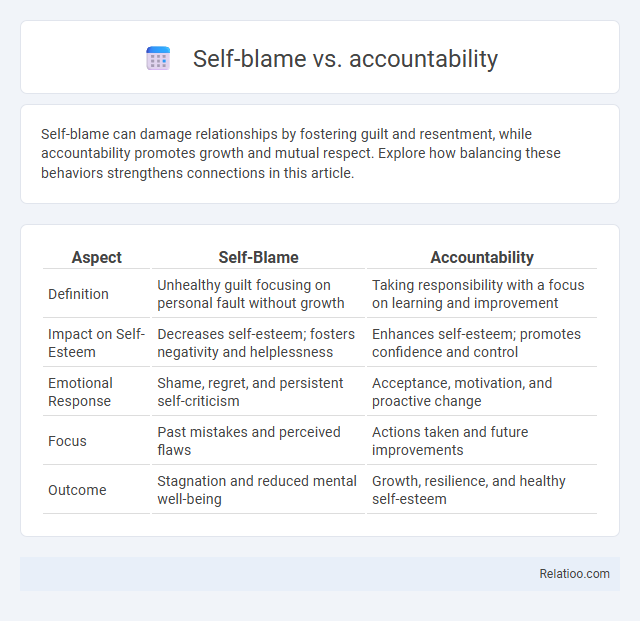Self-blame can damage relationships by fostering guilt and resentment, while accountability promotes growth and mutual respect. Explore how balancing these behaviors strengthens connections in this article.
Table of Comparison
| Aspect | Self-Blame | Accountability |
|---|---|---|
| Definition | Unhealthy guilt focusing on personal fault without growth | Taking responsibility with a focus on learning and improvement |
| Impact on Self-Esteem | Decreases self-esteem; fosters negativity and helplessness | Enhances self-esteem; promotes confidence and control |
| Emotional Response | Shame, regret, and persistent self-criticism | Acceptance, motivation, and proactive change |
| Focus | Past mistakes and perceived flaws | Actions taken and future improvements |
| Outcome | Stagnation and reduced mental well-being | Growth, resilience, and healthy self-esteem |
Understanding Self-Blame: Definition and Origins
Self-blame involves attributing personal responsibility for negative events, often leading to emotional distress and decreased self-esteem. Unlike accountability, which emphasizes responsible acknowledgment and constructive action, self-blame is rooted in internalizing fault excessively and irrationally. Understanding the origins of self-blame reveals its ties to early childhood experiences, cognitive distortions, and unresolved trauma, highlighting the importance of distinguishing it from healthy accountability for emotional well-being.
What Does True Accountability Look Like?
True accountability involves owning your actions honestly without falling into the trap of self-blame, which often includes unnecessary guilt or harsh self-criticism. It means recognizing mistakes with clarity, learning from them, and actively making changes to improve your behavior or decisions. Your ability to differentiate between constructive accountability and destructive self-blame empowers personal growth and responsible decision-making.
Key Differences Between Self-Blame and Accountability
Self-blame involves internalizing fault for negative outcomes and often leads to feelings of guilt and decreased self-esteem, whereas accountability emphasizes taking responsibility for actions with a focus on learning and growth. Accountability encourages constructive problem-solving and behavior change, while self-blame tends to perpetuate negative emotions without fostering improvement. Recognizing the key difference that accountability promotes ownership and proactive steps, whereas self-blame results in self-criticism, is essential for personal development.
Psychological Impacts of Self-Blame
Self-blame often leads to feelings of guilt, lowered self-esteem, and increased risk of depression and anxiety, distinguishing it from accountability, which promotes responsibility without emotional self-punishment. Unlike accountability, which encourages constructive self-reflection and learning, self-blame tends to foster rumination and helplessness, intensifying psychological distress. Understanding the harmful impact of self-blame is crucial for mental health, as it impedes personal growth and resilience by perpetuating negative self-perception.
The Benefits of Practicing Accountability
Practicing accountability fosters personal growth by encouraging individuals to take responsibility for their actions, leading to improved decision-making and strengthened trust in relationships. Unlike self-blame, which can cause stagnation and negative self-perception, accountability promotes constructive reflection and actionable change. Embracing accountability enhances resilience and empowers individuals to learn from mistakes, ultimately driving progress and emotional well-being.
Why People Confuse Self-Blame with Accountability
People often confuse self-blame with accountability because both involve recognizing personal responsibility for mistakes or outcomes. However, accountability focuses on learning from errors and making constructive changes, while self-blame leads to negative self-criticism and emotional distress. Your ability to distinguish between these concepts enables healthier coping mechanisms and fosters personal growth.
Overcoming Patterns of Self-Blame
Overcoming patterns of self-blame involves distinguishing it from accountability by recognizing self-blame as a harmful cognitive distortion that undermines self-esteem and motivation. Emphasizing accountability promotes constructive personal growth through accepting responsibility without harsh self-criticism. Cognitive-behavioral strategies and mindfulness practices are effective in breaking self-blame cycles and fostering balanced self-reflection.
Building Healthy Accountability Habits
Building healthy accountability habits involves distinguishing self-blame from accountability by focusing on constructive actions rather than emotional guilt. You can cultivate responsibility by setting clear goals, reflecting on mistakes objectively, and implementing solutions while avoiding negative self-criticism that undermines confidence. This approach improves personal growth and enhances emotional resilience by fostering a balanced mindset rooted in learning and progress.
Transforming Self-Blame Into Constructive Action
Transforming self-blame into constructive action involves shifting your mindset from negative self-criticism to proactive accountability, recognizing mistakes as opportunities for growth rather than personal failures. By embracing accountability, you acknowledge responsibility without emotional overload, enabling focused problem-solving and behavioral change. This approach empowers you to learn from setbacks and fosters resilience, turning self-blame into a catalyst for positive development.
Tools and Strategies for Balanced Self-Reflection
Effective tools for balanced self-reflection include journaling and mindfulness practices that promote self-awareness without harsh judgment. Cognitive-behavioral techniques help differentiate between self-blame and constructive accountability by focusing on actionable changes rather than past mistakes. Incorporating feedback from trusted peers and setting realistic goals also fosters accountability while preventing the negative impact of excessive self-blame.

Infographic: Self-blame vs Accountability
 relatioo.com
relatioo.com